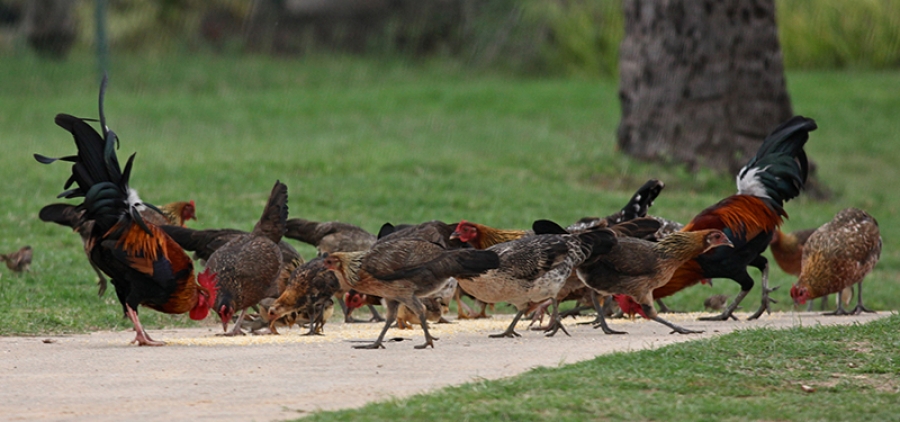Ruta Mave: Rarotonga roosters: ‘Proud by day loud by night’
Monday 31 July 2023 | Written by Ruta Tangiiau Mave | Published in Editorials, Opinion

The chooks on Rarotonga. 17091429
Roosters are bold and beautiful during the day, strutting around in their fancy plumage of sun kissed orange, yellow sandy creams, rich emerald greens and poignant dark ebony. Proud by day loud by night, what is the point of them? Ruta Mave explains.
Four in the morning and the roosters have started their crowing for no apparent reason as the sun is far from rising. Children’s books say they cock-a-doodle-doo which is a misleading attempt to give a lyrical label to their noise. What we hear every morning sounds like they are being strangled, straining their vocal cords to add volume. They certainly do not carry anything remotely close to a tone or tune.
A flock of hens can lay eggs without a rooster every 26 hours. These eggs will be unfertilised so there is no risk of cracking an egg into a pan to find a chick developing inside.
Inner city suburban backyard chicken enthusiasts are banned from having roosters due to them driving the neighbours mad with their constant crowing. There just aren’t enough free eggs to give away to placate someone who is sleep deprived from constant interrupted sleep.
They say a rooster brings order to the pack. Apparently, chickens like structure and follow a ‘pecking order’ which is strictly enforced and probably why they are used as common metaphors for work and life situations. The weaker hens defer to the larger hens in the absence of a rooster – somewhat like the Aunties in most cultures. The most aggressive of the hens will step up to ‘rule the roost’ although this is often disputed amongst the hens – also true of the Aunties.
Researchers says with a rooster in residence the social hierarchy is established – he is the peacekeeper keeping order by tending to the unruly flock and maintains calm. This observation sounds patriarchal. If hens ovulate every 26 hours that means it’s not a matter of ‘that time of the month’ but it’s potentially ‘that ‘time’ all day every day’. No number of docile hens can deal with that surge of hormonal chaos when living together. It’s also a throw away slant on any female showing signs of confidence and leadership.
It makes me think how did nunneries survive with so much estrogen contained in those hallowed halls. I didn’t grow up schooled or housed by nuns but from the depiction in movies and books from school pupils this lack of a rooster may explain some of the strict behaviours displayed by some of the ‘Mother Superiors’ on the weaker ‘chicks under their wings’.
The rooster is also seen as the protector, the guy you want in your corner when free ranging. He will keep an eye out on the ground and in the air for predators pushing hens to safety. It is said they will give their life to defend the flock – really? It is a noble and heroic gesture (must have been written by a male) because when you think about it if a perceived predator is after the hen, it will just as easily eat male meat as it will female. Or maybe the rooster was only good at strutting around crowing he is a lover not a fighter? The only evidence I have seen of roosters being aggressive here is when they chase down a hen for a quick squawk and release.
If you want to find a true fighter anywhere in the animal kingdom forget the male species, they have the brain if you will and yes, they will fight for their flock or herd – because they think they are the kingpin and if they don’t have a flock looking up to and following them, they are nothing. They fight for their title and status which is led by their often over inflated ego.
A female defending her young, now there is a fighter. She is driven by love and she will indeed fight to the death to protect those she has created and raised. Feats of unimaginable strength have been documented of mother’s lifting up a car to save a baby and literally taking a beating or bullet to protect their children from an over aggressive and egotistical rooster.
So why do we shoot bats who in the dark of the night hardly make a sound but we don’t shoot roosters? The plume feathers would be fantastic in a Te Maeva Nui costume headdress and do the rest of us and the tourists a favour in the process.
Female species can survive without males and are capable of anything. Pukapuka will be displaying what can be achieved this week. Without boys they will shine and dance their own tune – girls power. To be noted there is a hero rooster-wife team ensuring the pecking order and management, gets them onto the stage.









































